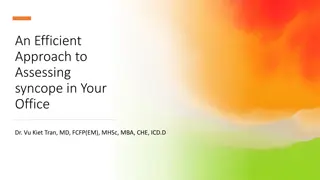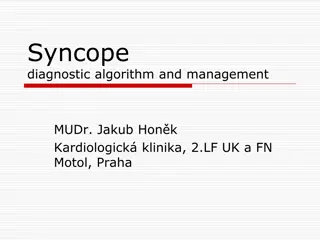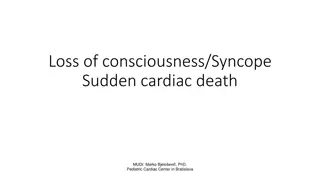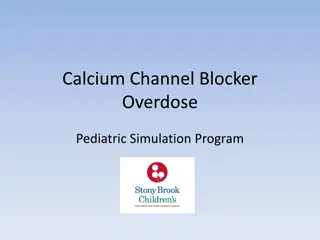Efficient Approach to Assessing Syncope in Office Practice
Dr. Vu Kiet Tran discusses an efficient approach to assessing syncope in office practice, focusing on risk factors for sudden cardiac death, the use of ECG and CT scans, and differential diagnosis to identify cardiac causes of syncope. Through case studies and learning objectives, key aspects of syn
4 views • 103 slides
Fainting Safety: Prevention and Recognition Strategies
Fainting, medically known as syncope, is a sudden loss of consciousness that can be caused by various factors like dehydration, heat, anxiety, or low blood pressure. This presentation debunks the myth of knee-locking causing fainting and focuses on prevention strategies such as proper hydration, nut
1 views • 14 slides
Syncope: Diagnostic Algorithm and Management Overview
Syncope is defined as a transient loss of consciousness due to cerebral hypoperfusion, with rapid onset and complete recovery. It poses risks of falls, trauma, and sudden death but is mostly benign in young individuals. Initial evaluation includes a thorough history, physical exam, and ECG. Classifi
0 views • 18 slides
Understanding Loss of Consciousness and Sudden Cardiac Death in Children
Loss of consciousness, including syncope and sudden cardiac death, is a significant concern in pediatric patients. The epidemiology shows that approximately 25% of children experience at least one episode of loss of consciousness before the age of 19, with girls visiting pediatricians more than boys
0 views • 5 slides
Calcium Channel Blocker Overdose in Pediatrics
Calcium channel blocker overdose is a critical condition that can be life-threatening, especially in children. The overdose can result in symptoms such as syncope, chest pain, weakness, and seizures due to the medication's effects on cardiovascular function. Prompt recognition and appropriate manage
0 views • 14 slides




